Politics
US Congress returns, with a one-month deadline to avert government shutdown
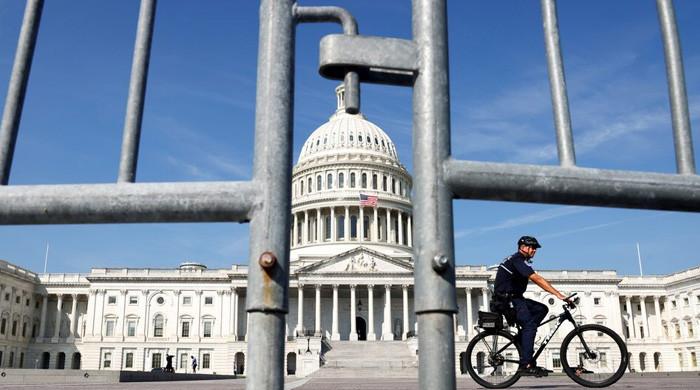
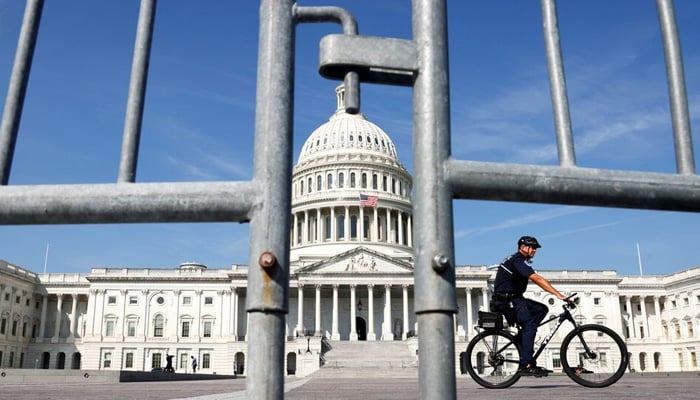
- Congress faces Sept 30 funding deadline amid partisan tensions.
- Senate requires bipartisan support for spending bills.
- DC takeover, Epstein files also on congressional agenda.
The US Congress returns on Tuesday with less than a month left to perform one of its core functions — keeping federal agencies funded and averting a partial government shutdown — a job that it has struggled to perform in recent years.
The chamber’s bitter partisan divides have hardened in the first year of President Donald Trump’s new administration, which has angered Democratic lawmakers by deciding not to spend some money previously approved under bipartisan deals, as well as the July passage of a tax-cut bill that nonpartisan analysts said could cause more than 10 million low-income Americans to lose healthcare coverage.
Lawmakers’ work on agreeing on the roughly $1.8 trillion in discretionary spending in the $7 trillion federal budget will be further complicated by expected fights over the release of information related to the late convicted sex offender Jeffrey Epstein, a former friend of Trump’s, and the administration’s surge of federal agents and National Guard into the capital.
There have been 14 partial government shutdowns since 1981, most of which lasted only a day or two. The most recent stretched over 34 days in December 2018 into January 2019 during Trump’s first term.
Trump’s Republicans hold a 219-212 majority in the House of Representatives and a 53-47 edge in the Senate, though that chamber’s rules require 60 votes to pass most bills, meaning that seven Democrats’ support would be needed to pass a funding bill.
A preemptive blame game started this summer over which party would be faulted if Congress fails and a partial government shutdown occurs.
In the lead up to Republicans’ approving Trump’s request for a $9 billion cut to foreign aid and public media, Senate Minority Leader Chuck Schumer said in a July letter that the majority should not expect Democrats to “act as business as usual” in the bipartisan appropriations process due to the party cutting back on funding already approved by Congress.
Schumer faced howls of outrage from some in his party in March after providing the votes for a continuing resolution to keep the government funded, arguing at the time that allowing a government shutdown would have been more damaging.
The Democrats’ full strategy this time around has not yet been defined, but the Democratic leaders have requested a meeting with their Republican counterparts to discuss the deadline. Some Democrats want assurances by Republicans to not unilaterally cut funding if more requests are made by the administration.
“I hope that the process will continue in a bipartisan way as we move toward the September deadline,” Senate Majority Leader John Thune said in a floor speech.
Some Democrats, including Senator Elizabeth Warren of Massachusetts, are betting the conservatives would be blamed and that the funding deadline should be used as leverage.
“In September the Republicans are going to need to get a budget through to keep the government open and to do that they are going to need some Democratic votes,” Warren said at a rally in Nebraska in August. Referring to the sweeping tax-cut bill, she added, “You want my vote — and I hope the votes of the rest of these Democrats — then by golly, you can restore healthcare for 10 million Americans!”
The US federal debt is $37.25 trillion, according to the Treasury Department. It has continued to grow under Republican and Democratic administrations as the US Congress continues to authorise the federal government to spend more money than it takes in.
Politics
New Epstein files dump contains multiple Trump references
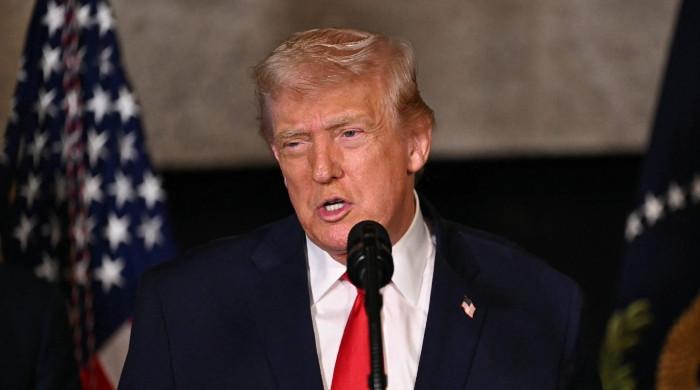
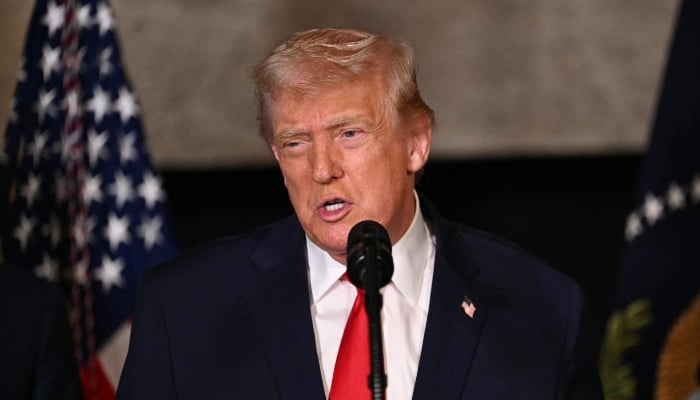
A new batch of files released on Tuesday by the US government in relation to the notorious late sex offender Jeffrey Epstein contains numerous references to Donald Trump, including documents detailing flights he took on his then close friend’s private jet.
The Justice Department swiftly issued a statement defending the 79-year-old Republican president.
“Some of these documents contain untrue and sensationalist claims made against President Trump that were submitted to the FBI right before the 2020 election,” the Justice Department said on X, without specifying which allegations were false.
“If they had a shred of credibility, they certainly would have been weaponised against President Trump already,” the department said.
Epstein cultivated a wide circle of powerful friends, including Trump, and was alleged to have run an underage sex trafficking ring before his 2019 death in jail.
Trump, who is not accused of any wrongdoing, fought for months to prevent release of the vast trove of documents collected during years of investigations into the disgraced financier.
A rebellion inside Trump’s Republican Party forced him to sign off on a law mandating release of all the documents. The extraordinary move reflected intense political pressure to address what many Americans, including Trump’s own supporters, have long suspected to be a cover-up.
A first batch was made public last Friday amid fierce criticism that the Justice Department was deliberately slow-walking the release and excluding any references to Trump.
The latest slew of documents contains 8,000 files, including hundreds of videos or audio recordings. This includes surveillance footage from August 2019, the month Epstein was found dead in his jail cell — and declared to have committed suicide.
Private jet trips
Trump was friends for years with Epstein and the two of them were photographed together at parties.
The Republican has given different accounts of how he ended their relationship.
He has said they fell out when Epstein “stole” young women working in the spa at his Florida golf club. He also says he threw Epstein out of his Florida golf club for being “a creep.”
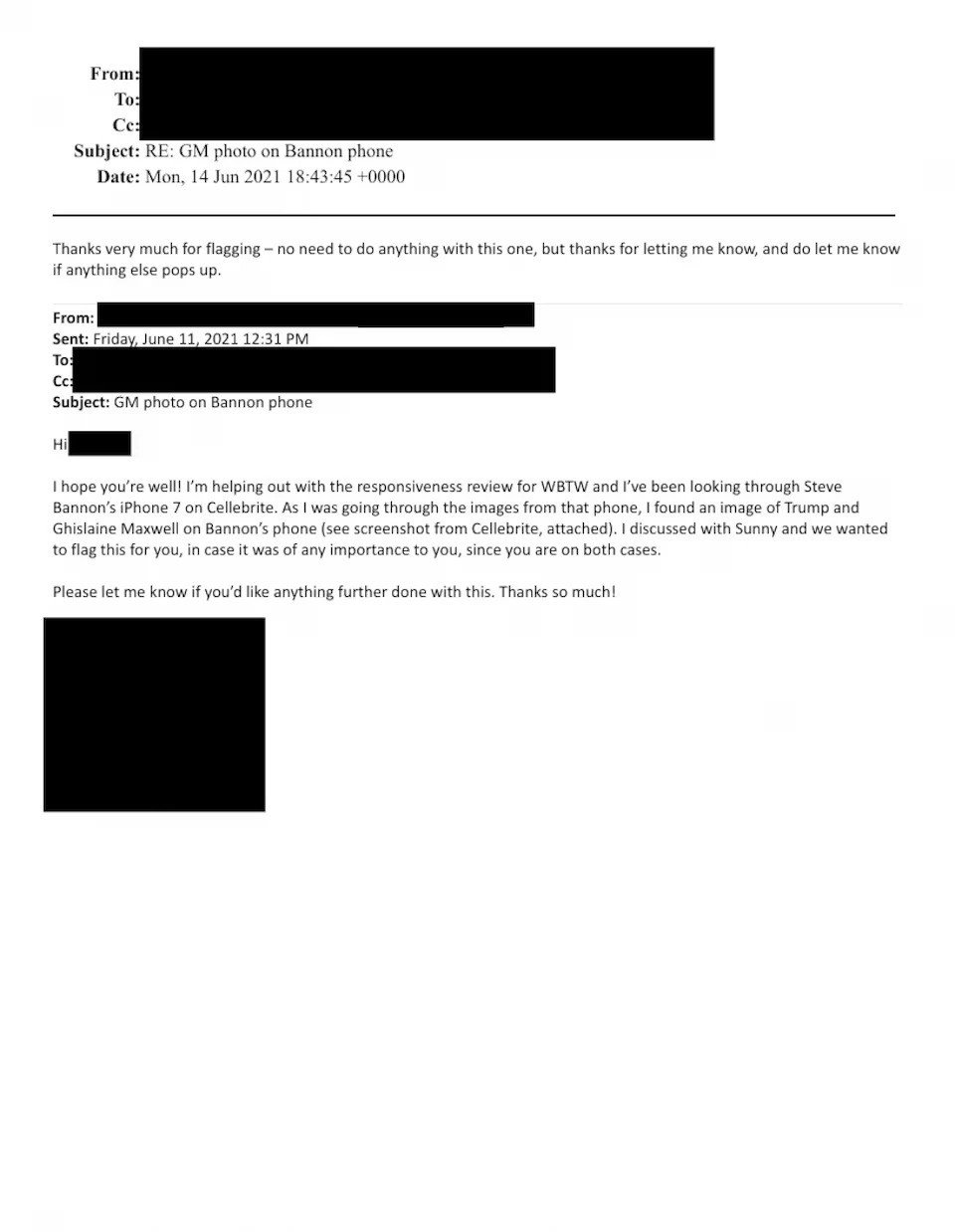
But despite Trump’s repeated claims that he was not close to Epstein, there is considerable evidence to the contrary.
The latest documents include a January 2020 note from New York federal prosecutors who were investigating Epstein’s associate, Ghislaine Maxell, detailing Trump’s repeated travel on the financier’s private jet.
It says “records we received yesterday reflect that Donald Trump travelled on Epstein’s private jet many more times than previously has been reported (or that we were aware).”
Some of the references to Trump in the documents are impossible to verify and there are no indications of criminal behaviour.
One is in a handwritten letter attributed to Epstein and written from jail to Larry Nassar, the former US gymnastics doctor who was imprisoned over rampant abuse of female athletes.
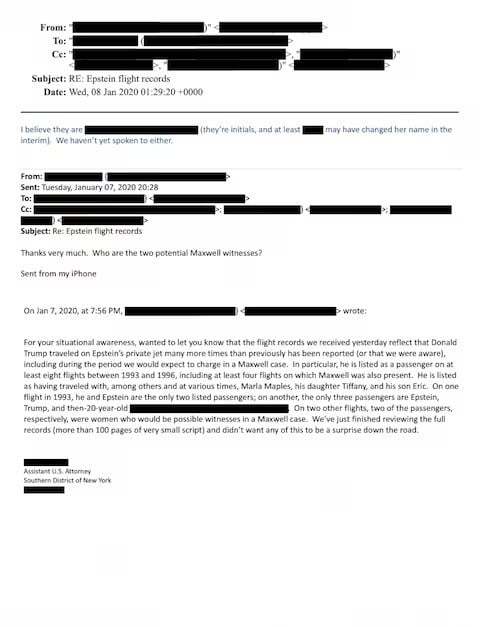
The letter has Epstein purportedly complaining to Nassar that they were incarcerated while the “president shares our love of young, nubile girls. When a young beauty walked by he loved to ‘grab snatch.'”
On Monday, Trump again said he didn’t approve of the file dumps, saying innocent people would be tarnished.
“Everybody was friendly with this guy,” he told reporters.
Delays
Deputy Attorney General Todd Blanche has blamed delays in releasing the files on the need to redact the identities of Epstein’s more than 1,000 victims from the hundreds of thousands of documents and photos in the government’s possession.
The co-sponsors of the bill requiring release of the files — Ro Khanna, a Democrat, and Thomas Massie, a Republican — threatened over the weekend to bring contempt of Congress charges against Attorney General Pam Bondi for failing to comply.
The tranche of materials released on Friday included photographs of former Democratic president Bill Clinton and other famous names, such as pop stars Mick Jagger and Michael Jackson, who were in Epstein’s social circle.
Clinton urged the Justice Department to release any materials in the files related to the former president, saying he had nothing to hide.
Maxwell, Epstein’s associate and former girlfriend, remains the only person convicted in connection with his crimes.
Politics
Bangladesh summons Indian envoy as protest erupts in New Delhi
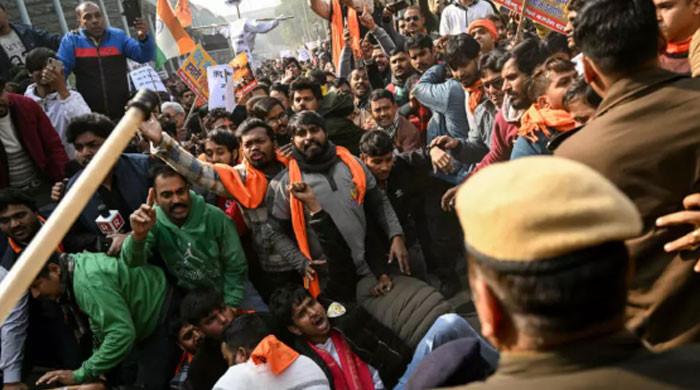

- Indian envoy summoned to express “grave concern”, says ministry.
- India dismissed reports of vandalism as “misleading propaganda”.
- Bangladesh-India ties deteriorate since ex-PM Hasina fled New Delhi.
DHAKA: Bangladesh on Tuesday summoned the top Indian envoy as fresh protests erupted outside its high commission in New Delhi over the mob lynching of a Hindu worker in Dhaka.
The garment worker was accused of blasphemy and lynched on December 18 as anti-India sentiment rises in the neighbouring majority Muslim nation. Seven suspects have been arrested over the killing.
On Tuesday, hundreds of demonstrators converged near Bangladesh’s High Commission in New Delhi waving saffron flags and banners, including one that read: “Stop Killing Hindus in Bangladesh”.
“Hindus are warning Bangladesh that it is taking the wrong approach,” said Puneet Gautam, 37, a protester and member of the right-wing Vishva Hindu Parishad (VHP) organisation.
VHP members and security personnel clashed outside Dhaka’s outpost as the crowd shoved its way through yellow metal barricades around 300 metres from the building.
Earlier on Tuesday, Bangladesh’s foreign ministry had summoned Indian High Commissioner Pranay Verma to express “grave concern” over previous protests outside its visa centres.
In its statement, the ministry cited “regrettable incidents” and vandalism outside its visa centres in New Delhi and Siliguri last week. India has dismissed reports of vandalism as “misleading propaganda”.
Ties between the neighbours have deteriorated since ousted prime minister Sheikh Hasina fled the pro-democracy uprising last year and sought refuge in India.
India says it is still considering Dhaka’s requests to extradite Hasina, who was sentenced to death in absentia for orchestrating a deadly crackdown on the uprising.
Bangladesh has been in political turmoil since the end of Hasina’s rule, with violence marring the campaigning ahead of next year’s election.
This month, parliamentary hopeful and vocal India critic Sharif Osman Hadi was shot by masked assailants in Dhaka, with unconfirmed reports suggesting his attackers might have fled to India.
The killing set off protests in Dhaka with arsonists torching several buildings, including two major newspapers deemed to favour India as well as a prominent cultural institution.
Mobs also pelted stones at the Indian High Commission in the port city of Chattogram, where India has since suspended visa services.
On Monday, Dhaka temporarily suspended visa services in Delhi.
Russia has urged Delhi and Dhaka to mend fences.
“The sooner this happens, the better,” Russian Ambassador to Bangladesh, Alexander G Khozin, was quoted as saying in the Dhaka Tribune.
Politics
New York Times reporter sues Google, xAI, OpenAI over chatbot training


An investigative reporter best known for exposing fraud at Silicon Valley blood-testing startup Theranos sued Elon Musk’s xAI, Anthropic, Google, OpenAI, Meta Platforms and Perplexity on Monday for using copyrighted books without permission to train their artificial intelligence systems.
New York Times reporter and “Bad Blood” author John Carreyrou filed the lawsuit in California federal court with five other writers, accusing the AI companies of pirating their books and feeding them into the large language models (LLMs) that power the companies’ chatbots.
The lawsuit is one of several copyright cases brought by authors and other copyright owners against tech companies over the use of their work in AI training. The case is the first to name xAI as a defendant.
Spokespeople for the defendants did not immediately respond to requests for comment on the lawsuit.
Unlike other pending cases, the writers are not seeking to band together in a larger class action – a type of lawsuit they said favours defendants by allowing them to negotiate a single settlement with many plaintiffs.
“LLM companies should not be able to so easily extinguish thousands upon thousands of high-value claims at bargain-basement rates,” the complaint said.
Anthropic reached the first major settlement in an AI-training copyright dispute in August, agreeing to pay $1.5 billion to a class of authors who said the company pirated millions of books.
The new lawsuit said class members in that case will receive “a tiny fraction (just 2%) of the Copyright Act’s statutory ceiling of $150,000” per infringed work.
Monday’s complaint was filed by attorneys at law firm Freedman Normand Friedland, including Kyle Roche, whom Carreyrou profiled in a 2023 New York Times article.
During a November hearing in the Anthropic class action, US District Judge William Alsup criticised a separate law firm Roche co-founded for gathering authors to opt out of the settlement in search of “a sweeter deal.” Roche declined to comment on Monday.
Carreyrou told the judge at a later hearing that stealing books to build its AI was Anthropic’s “original sin” and that the settlement did not go far enough.
-

 Business1 week ago
Business1 week agoStudying Abroad Is Costly, But Not Impossible: Experts On Smarter Financial Planning
-

 Fashion6 days ago
Fashion6 days agoIndonesia’s thrift surge fuels waste and textile industry woes
-

 Business1 week ago
Business1 week agoKSE-100 index gains 876 points amid cut in policy rate | The Express Tribune
-

 Sports1 week ago
Sports1 week agoJets defensive lineman rips NFL officials after ejection vs Jaguars
-

 Business6 days ago
Business6 days agoBP names new boss as current CEO leaves after less than two years
-

 Tech6 days ago
Tech6 days agoT-Mobile Business Internet and Phone Deals
-

 Entertainment1 week ago
Entertainment1 week agoPrince Harry, Meghan Markle’s 2025 Christmas card: A shift in strategy
-

 Sports5 days ago
Sports5 days agoPKF summons meeting after Pakistani player represents India in kabaddi tournament






